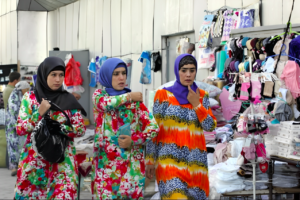Azerbaijan and Iran want to maintain pragmatic relations. Yet that’s becoming increasingly difficult.
Tensions between Iran and Azerbaijan are reaching a critical point. The two neighbors have never been friendly, but pragmatism driven by growing bilateral trade and at times overlapping geopolitical imperatives often aided the search for common ground.
This changed after the 2020 war in Nagorno-Karabakh when Azerbaijan decisively defeated Armenia, re-established control over the lost territories, and has ever since pressed its military and economic advantage to force Armenia into a peace deal that would recognize the two countries’ territorial integrity (as currently defined).
As one of the big three powers bordering the South Caucasus states, Iran would view Azerbaijan’s assertiveness with close interest at the best of times; the fact that it is aimed at its close friends in Armenia makes it a matter of deep concern. Iran would likely intervene should Armenia’s internationally recognized borders be challenged. While Armenia’s southernmost Syunik corridor provides Iran with land access to the country’s capital Yerevan and Georgia to the north, it also provides the east-west route between Azerbaijan and its exclave of Nakhchivan. There is a lot at stake for both sides.
That helps explain the rhetorical barrages now regularly fired between Azerbaijan and Iran. Each accuses the other of interfering in its internal affairs, while Azerbaijan has made a series of arrests of alleged pro-Iranian figures across the country. On March 28, the Azeri MP Fazil Mustafa, widely known for his criticism of Iran, was shot and wounded outside his home. That followed a deadly attack on the Azerbaijani embassy in Tehran earlier this year, while in early April, Azerbaijan expelled four Iranian diplomats for “provocative actions”.
Iran has chosen the dual messaging of deterrence and diplomacy. On the one hand, it talks to Azerbaijan seemingly to dial down tensions, but on the other, the Islamic Republic has upped its military game by staging exercises along its border with Azerbaijan. Much of their mutual border runs along the River Aras, making Iran’s river crossing drills particularly pointed.
Were there to be open conflict, the stakes are high and would have broader geopolitical repercussions.
Azerbaijan has traditionally close ties to Turkey and has lately been seen as a critical energy partner for the European Union (EU.) But it is Azerbaijan’s expanding ties with Israel that really make Iran jittery. Baku inaugurated its embassy in Tel Aviv and on March 29 Israeli Foreign Minister Eli Cohen said he had agreed with his Azerbaijani counterpart Ceyhun Bayramov to “form a united front against Iran”, though Baku later tried to carefully distance itself from the statement.
The two countries shared, “the same perception of the Iranian threat. The Iranian ayatollah regime threatens both our regions, finances terrorism, and destabilizes the entire Middle East. We must act together to prevent Iran from achieving nuclear capabilities,” Cohen said. Iran demanded an explanation for the trumpeted strategic partnership between the two countries, then complained when none was received.
It is notable that not only has Iran’s nuclear facilities and scientists come under attack in recent years, but so too has military production infrastructure, including some connected to ballistic missile production and drones. US and other officials have been quoted as linking two such attacks this year to Israel. Azerbaijan was not mentioned in either case, although there have been stories in Israeli and other media suggesting potential Israeli access to Azerbaijani airfields and the Iranian media regularly promotes this narrative.
Iran has further worries. Azeri Turks make up around a quarter of Iran’s population and are concentrated in the northwest of the country, near the Azerbaijan border. They joined the huge women-led protests which began in 2022 which at times appeared to leave the government close to impotent.
Azerbaijan has also been investing in closer ties with Iraqi Kurdistan, another neighbor with whom Iran has hostile relations. Kurds too are a discontented Iranian minority and also joined the 2022 protests.
For Iran, the South Caucasus have been low on the traditional list of priorities. It has few pro-Iranian proxies to employ and nor has it possessed the soft power or economic muscle to influence the region in the way that Turkey and Russia could.
But the Middle East and South Caucasus are becoming much more closely linked. Regional security and energy resources underpin the growing interconnection. Russia and Turkey, which since the 2010s have been active in increasing their military and economic footprint in the wider Middle East, now, as the Second Nagorno-Karabakh war demonstrated, consider the South Caucasus part of a greater geopolitical game that stretches from the Mediterranean to the Caspian seas. The trend is clear: for the first time since the early 19th century when the Russian empire began its expansion into the South Caucasus and effectively cut the region off from the Middle East, the two regions are again growing closer.
The West should pay close attention to these developments because there is a risk that it may be shut out from South Caucasus altogether. Given that the region is increasingly important for Europe in particular, as a source and transportation route for energy, it is well worthwhile to pursue policies to build a more secure space.
This will require a new approach, less dependent on sugared words about democracy and peace, and more reliant on economic realities and the military balance of power. It is in these last two areas that the West is lagging far behind its opponents.
Emil Avdaliani is a professor at European University and the Director of Middle East Studies at the Georgian think-tank, Geocase.
Europe’s Edge is CEPA’s online journal covering critical topics on the foreign policy docket across Europe and North America. All opinions are those of the author and do not necessarily represent the position or views of the institutions they represent or the Center for European Policy Analysis.
Source : CEPA











